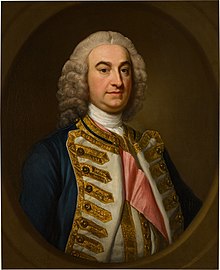The Lord Hawke | |
|---|---|
 | |
| First Lord of the Admiralty | |
| In office 1766–1771 | |
| Prime Minister | Lord Chatham Duke of Grafton Lord North |
| Preceded by | Sir Charles Saunders |
| Succeeded by | Lord Sandwich |
| Personal details | |
| Born | 21 February 1705 London, England |
| Died | 17 October 1781 (aged 76) Sunbury-on-Thames, Great Britain |
| Resting place | St. Nicolas' Church, North Stoneham, Hampshire, England |
| Profession | Admiral, Statesman |
| Military service | |
| Allegiance | |
| Branch/service | |
| Years of service | 1720–1781 |
| Rank | Admiral of the Fleet |
| Commands | HMS Wolf HMS Flamborough HMS Portland HMS Berwick HMS Neptune Western Squadron Commander-in-Chief, Portsmouth |
| Battles/wars | |
Edward Hawke, 1st Baron Hawke, KB PC (21 February 1705 – 17 October 1781),[1] of Scarthingwell Hall[2] in the parish of Saxton with Scarthingwell, near Tadcaster, Yorkshire, was an English Royal Navy officer. As captain of the third-rate HMS Berwick, he took part in the Battle of Toulon in February 1744 during the War of the Austrian Succession. He also captured six ships of a French squadron in the Bay of Biscay in the Second Battle of Cape Finisterre in October 1747.
Hawke went on to achieve a victory over a French fleet at the Battle of Quiberon Bay in November 1759 during the Seven Years' War, preventing a French invasion of Britain. He developed the concept of a Western Squadron, keeping an almost continuous blockade of the French coast throughout the war.
Hawke also sat in the House of Commons from 1747 to 1776 and served as First Lord of the Admiralty for five years between 1766 and 1771. In this post, he was successful in bringing the navy's spending under control and also oversaw the mobilisation of the navy during the Falklands Crisis in 1770.
- ^ Grossman, Mark (2007). World Military Leaders: A Biographical Dictionary. Infobase Publishing. ISBN 9780816074778.
- ^ "Hawke, Sir Edward 1710-81". History of Parliament. Retrieved 7 January 2020.